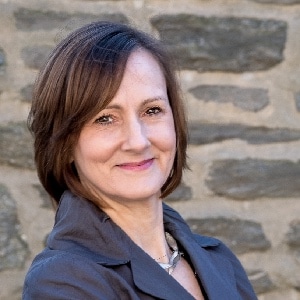by Alice Dommert
It was a typical morning as my 16-year old daughter loaded up her enormous backpack. I packed her lunch bag. We headed to the car. She seemed to be half asleep, so I was surprised to hear her voice.
“We had an interesting conversation in art class yesterday with our teacher.” She loves her art teacher and I was happy to have her share something about school and offer some morning conversation.
“What did you guys talk about?” I asked.
“The fact that there is no closet and no place to hide if a shooter comes into our art class,” she said.
My heart sank. I felt the sting of tears in my eyes. I kept driving and took a breath. What do you say to the reality of this rupture of innocence?
I finally said, “That sounds like a hard conversation. I’m so sorry.” My daughter replied that it was good to have voiced their fears and talked about it with their teacher.
I dropped her off and realized that this beautiful teenage girl has the usual worries of high school and her junior year, but also the fear of being shot in school by a classmate. The next thought made my heart sink even further. Her father is a high school teacher who might someday need to protect his students. And he would, in a heartbeat.
As I drove home, I thought about when I was an 11th grader, when the two words school and shooter being connected in any way would have been unimaginable. Yet, here we are. Our kids live in a world that is different than what we experienced growing up. The statistics on the rise in anxiety, depression, and suicide among today’s teens are overwhelming. We see it around us, in the lives of our families and friends. We blame it on social media or smartphones or a vaccine or their diet. Is there nothing to do but wring our hands in despair?
Positive psychology provides us with valuable tools to help navigate these tumultuous times for ourselves and for our children. We are models for our children, and they are witnessing our sense of futility or hope. Each day, our actions become the stones that pave the path of our legacy. I am now able to understand the things my parents did to plant seeds of hope in me, and how this hope took root. I recognize the bounty of those seeds every day in the joys of my life. The tools of positive psychology that I learned during the Certificate in Positive Psychology have helped ensure I can do the same for my children.
One of the most powerful experiences for me was the Best Possible Self exercise. I remember it so clearly, and the reaction it provoked when it was introduced to us.
It is five to 10 years in the future. You have worked hard and everything has gone well. Write about it.
The energy in the room was fascinating. Some of my fellow CIPPsters beamed and began writing with gusto, as if they had just popped the cork on a bottle of champagne and taken those first sweet sips. Others looked curious, as if they didn’t quite understand the assignment, or what they had heard was in a foreign language. What? Imagine a wonderful life for yourself?
Another group looked terrified, as if the teacher had announced a pop quiz and they hadn’t studied. This was the moment of reckoning, and they had nothing.
There was the sprinkling of people who quickly began to write and then stopped. The tears dropped on the pages of their notebooks, and I sensed that a nerve of deep sadness had been touched by this exploration of possibility.
Nine months later, we revisited that exercise and heard story after story about how much of what people had written had come true. The act of getting clear about planting their own seeds of hope made something happen. The dreams took root and started growing.
</p.
Another of the beautiful gifts of CiPP was the question posed to us, ”What if you hold back, don’t step forward, don’t allow yourself to be your fullest best self? What will the world be missing?”
Here in Philadelphia, we were elated about the Eagles winning the Super Bowl this year. The shared joy was beyond words. Two young, humble quarterbacks, a committed team, and a sports-crazed city of fans who had been longing for a win for 51 years made that happen. A legacy of hope spread from one generation of Eagles fans to the next made that happen. Dreams and a best possible life imagined, and steps taken every day toward that future, made that happen.
Our children need us to be fearless right now, arriving with nothing held back and our arms and hearts filled with our belief in our own and their positive future. We can show them how to dream.
That is the legacy of hope I wish for our children. It’s a win-win for us and for them.
Alice Dommert is the founder and CEO of Prasada, a group of health and wellness professionals, and a WholeBeing Architect. She has a unique background as a licensed architect and exhibit designer, writer, speaker, and consultant, with training in yoga and mindfulness, breathwork, positive psychology, and organizational development. In 2009, she founded Prasada to deliver skills and practices for wholebeing to the workplace so individuals and their organizations can thrive. Alice leads the Prasada team, working with clients across the country to build positive cultures for human sustainability through professional development and wellness programs. prasadawholebeing.com










